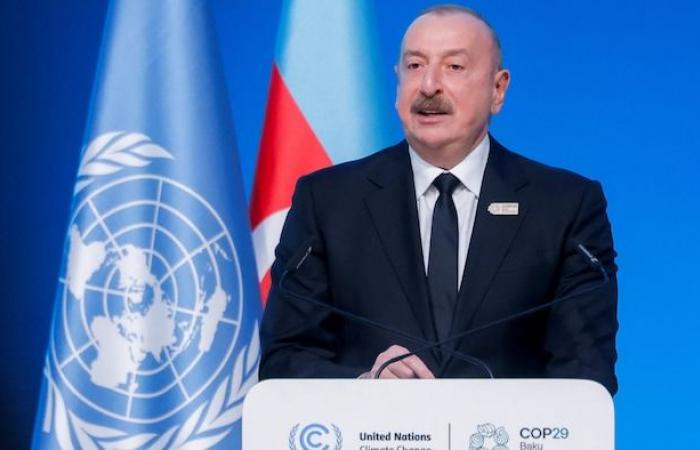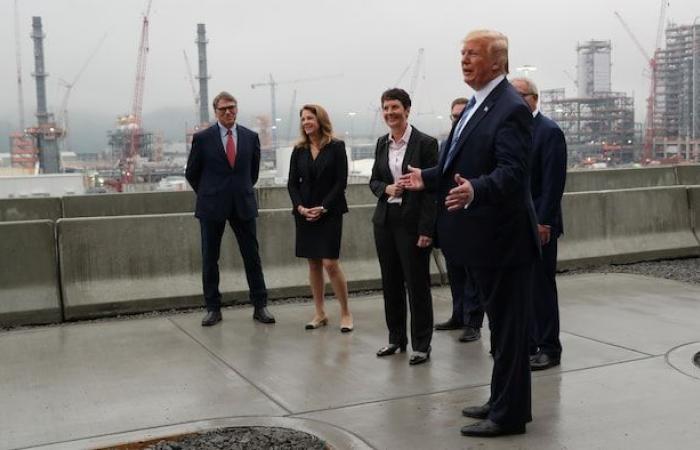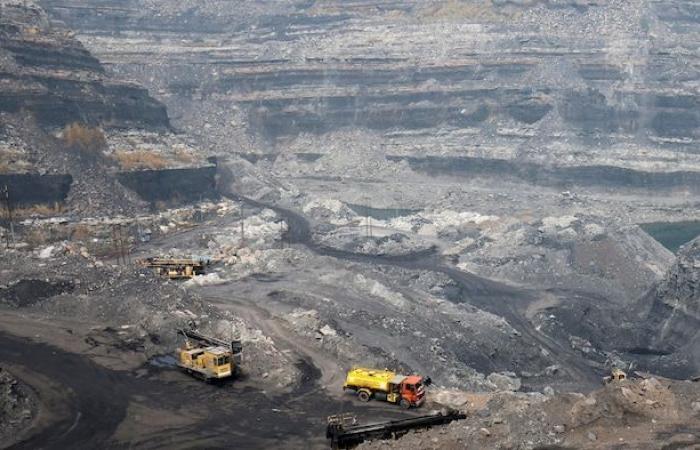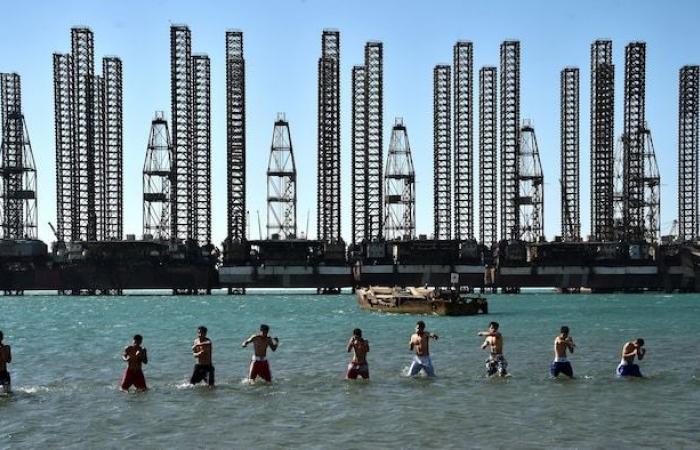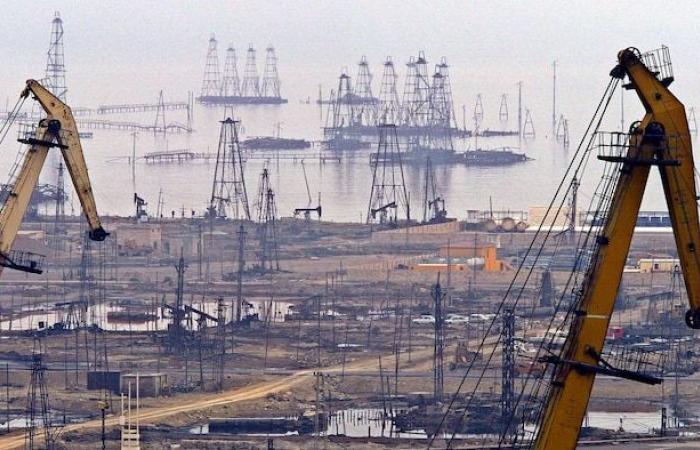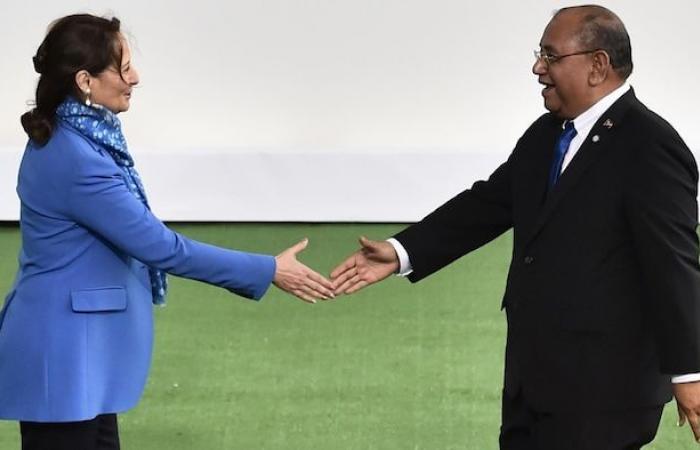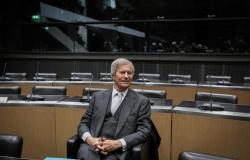It doesn't smell good. Literally and figuratively.
In Baku, at the COP29 venue, delegates and journalists report a persistent smell of oil in the air. Heavy odors, traces of the presence of flares from the refineries which border this city on the banks of the Caspian Sea.
The three skyscrapers that dominate the city, the Flame Towers, in the shape of a flame, represent the legacy of oil and gas in this country nicknamed the land of fire
.
If there is a symbol needed to illustrate the challenge that this summit represents, this is certainly it.
These two resources are gifts from god
declared the President of Azerbaijan, Ilham Aliyev, from the outset, in front of the hundred world leaders who traveled to Baku for COP29.
It sets the tone.
Open in full screen mode
Azerbaijan President Ilham Aliyev speaks to heads of state and government at the opening ceremony of the United Nations Climate Change Conference in Baku (COP29).
Photo : Reuters / Maxim Shemetov
A lot of water has flowed under the bridge since 2015, as 196 nations, rich and poor, came together to sign the Paris Agreement. A historic moment in international diplomacy, giving rise to the very first universal climate agreement.
It is clear that a decade later the world has changed greatly.
Although climate action has never had an easy path, the headwinds this year are concerning.
Let's keep one fact in mind: current climate policies are leading us on a trajectory toward global warming. catastrophic
of 3.1°C by the end of the century, according to the recent Emission Gap Report (New window) of the United Nations. And if countries keep all their promises to reduce emissions, the global average temperature will still rise by 2.6°C.
It is with these figures in mind that we must understand the challenge facing climate diplomacy at COP29.
I have attended 18 climate COPs since 2005, and I do not remember a United Nations summit on climate change being held in such an unfavorable context.
At least two factors explain this.
Open in full screen mode
U.S. President Donald Trump visits the Shell Pennsylvania petrochemical complex in Monaca, Pennsylvania.
Photo : Reuters / Jonathan Ernst
Donald Trump, catalyst for climate inaction
For one, the return of Donald Trump at the head of the United States – the second polluter on the planet – changes the situation. Even if many minimize the effects of this political event, the fact remains that it is a major earthquake on the planet climate.
Can one man alone destroy the entire edifice of climate action built over three decades? Certainly not. But it can create cracks deep enough to significantly slow down the work. Donald Trump has never left his planet of climate denial, even if the country he is preparing to lead for a second time is on the front line of climate upheaval.
The American negotiators present in Baku may speak in the name of the Biden administration, but their words no longer carry much weight. The delegates from around the world around the table know very well that, within a few weeks, the new president-elect will withdraw the United States (New window) of the Paris Agreement.
A gesture that could cause a more harmful domino effect than we think.

Open in full screen mode
General view of the Topa opencast coal mine in Ramgarh district of the Indian state of Jharkhand, India, February 27, 2024.
Photo : Reuters / Amit Dave
Indeed, if the richest country on the planet, and also the largest emitter of GHGs in history, announces that it will abandon climate action in favor of the fossil fuel industry, why do countries like would India, Indonesia, Japan or even Canada deprive themselves of it? Why would they continue to rack their brains and sacrifice part of their economy if the world's leading power, the one that should set the example, announces with great fanfare that it will no longer do so?
Of course, the return of Donald Trump does not mean that the energy transition underway on the planet, including that currently taking place in the United States itself, will stop.
But let's take the example of India, the world's third largest polluter, which still relies heavily on fossil fuels and which shows a growing reluctance for UN multilateralism. With the arrival of Donald Trump, Narendra Modi, at the head of the country, could feel authorized to ease off this transition, especially in a context of economic contraction.
In the context where scientists prescribe a reduction in global emissions of 42% by 2030 to remain within reach of the objective of a warming threshold of 1.5°C, we will not be able to do this without the United States. United and India.
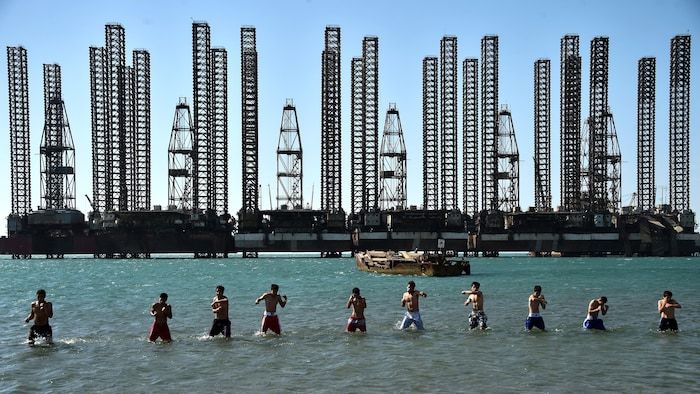
Open in full screen mode
Teenagers from a boxing school take part in a training session in the Caspian Sea, in front of an oil platform in Baku.
Photo : afp via getty images / KIRILL KUDRYAVTSEV
Authoritarian and oil state… again
The second factor unfavorable to this COP29 is the choice of the country where the conference takes place.
This UN climate summit is the third COP in a row to be held in a state heavily dependent on its fossil fuel exports. After Egypt in 2022 and the United Arab Emirates in 2023, Azerbaijan is in turn hosting a conference where the shadow of oil and gas interests hangs over the negotiations.
Although experiencing intense climatic effects, particularly with the Caspian Sea emptying of its water, this country of 10 million inhabitants has an economy based on two pillars: oil and gas. Hydrocarbons alone account for 92% of this state’s exports.
Moreover, as was the case in Egypt and the Emirates, Azerbaijan is expected to take advantage of the summit to do business.
For example, the number two of the COP, Elnur Soltanov, Azerbaijani Deputy Minister of Energy and member of the board of directors of SOCAR, the national oil and gas company, was caught in the act of promoting future agreements on his country's fossil fuels just before the start of the event. He was filmed chatting with what he believed to be a Hong Kong investor, to whom he offered to put him in contact with SOCAR for a future transaction. In reality, the investor in question was a member of the NGO Global Witness. The BBC relayed the video (New window).

Open in full screen mode
Oil towers stand in the oil-rich Caspian Sea near the capital Baku.
Photo : afp via getty images / TARIK TINAZAY
Azerbaijan's energy resources are highly coveted by the countries of the European Union, Turkey and the Gulf countries. Baku blows hot and cold while also taking care of its relations with Moscow and intends to take advantage of its privileged situation to the maximum.
Also for the third time, the climate COP is led by an authoritarian regime which limits freedom of expression (New window) environmental defenders. A blemish in the UN bulletin.
Although they are absolutely essential to motivate each country's climate action, these major UN meetings are less and less popular with citizens. The feeling that these meetings have turned into major trade fairs is increasingly widespread.
In the context of a gloomy economic situation in the West, in the face of which the purchasing power of citizens is constantly eroding (the election of Donald Trump has clearly shown this), public attention to climate issues is diminishing. . Add to this an explosive geopolitical reality on the planet, with wars in Ukraine and the Middle East draining most of the world's diplomatic energy.
In the world's parliaments, between the cost of living, public deficits and wars, the climate issue is relegated to the background.
Discourage citizen support
If there is one element that is absolutely fundamental for elected officials to be able to justify the implementation of public policies to protect the climate, it is that citizens adhere to them.
By accepting that COP29 will be held once again in an oil regime, in the context of great climate fatigue experienced by the populations, the UN contributes to fueling public disenchantment with this crucial issue and to undermining the credibility of the climate negotiations with the general public.
This is a shame, because losing the support of citizens is an obstacle to climate action.
Even though it is very imperfect, the COP forum is the only real tool we have to agree on the best ways to mitigate the effects of climate change.
We could very well decide to rely on the G20 countries – which emit nearly 80% of the world's GHGs – to resolve the problem. But faced with such a model, developing countries, which are not historically responsible for the phenomenon, but which suffer its worst effects, would no longer have a say.

Open in full screen mode
The President of the Marshall Islands, Christopher Loeak, and the French Minister of Ecology, Ségolène Royale, during COP21, where the Paris Climate Agreement was adopted.
Photo : afp via getty images / LOIC VENANCE
However, the main goal of COP29 is precisely to strengthen relations between the North and the South. It is about rethinking financial flows and mobilizing as much money as possible, public and private, in order to help the countries of the South protect themselves against climate change, and to offer them the means to develop without fossil fuels. Without this forum, in which they have the power of the group, the less fortunate would not be able to make themselves heard.
Climate protection is a global problem that calls for a global solution. It is, together, to avoid the unmanageable and manage the inevitable
a phrase that regularly comes up in scientists' discourse.
The re-election in the United States of the one that the newspaper Liberation baptized from climate arsonist
the general disinterest of citizens in the COPs and the global economic context greatly complicate things.
If there is a warming in terms of temperatures, the same cannot be said of multilateralism.
On this side, it's polar winter.

